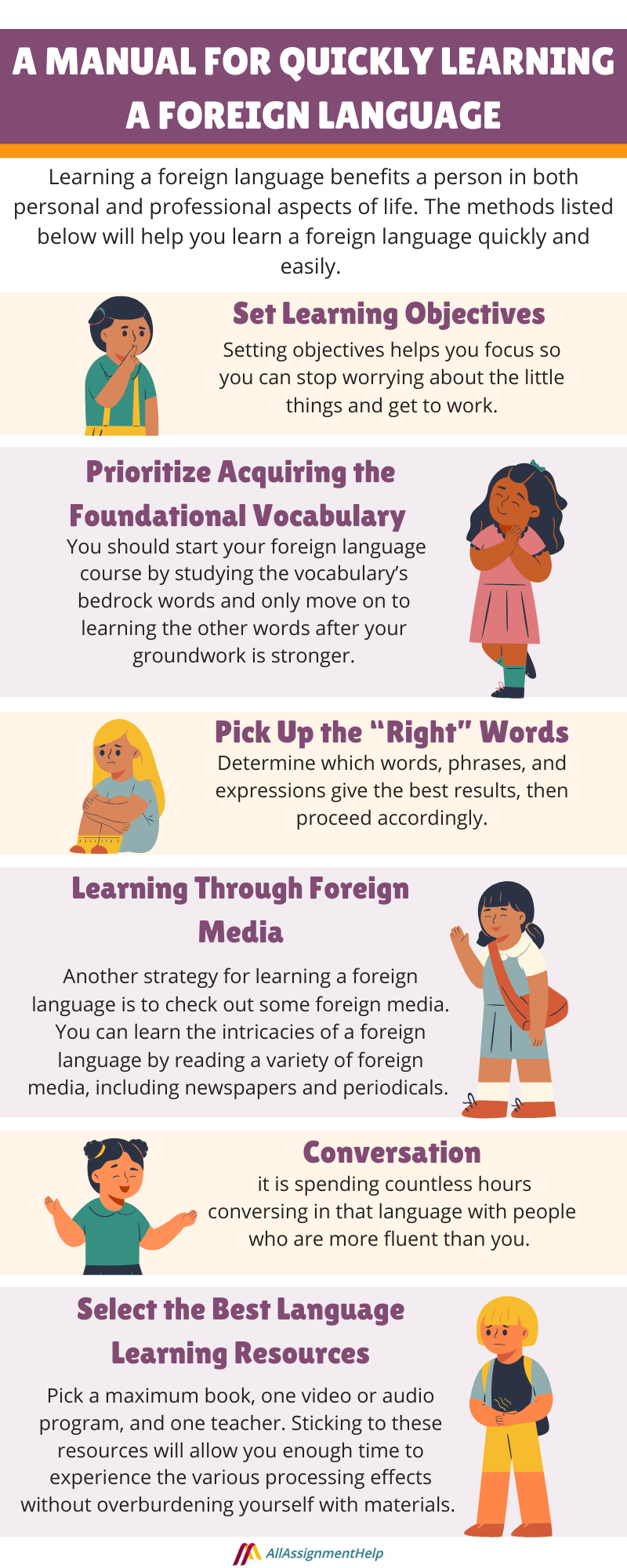Table of Contents
Learning a new foreign language requires finding the best method for you—and it’s not always easy. Everyone has their “best” approach, and it’s easy to get caught up in deciding how to learn rather than focusing on learning. However, mastering a foreign language can open up new opportunities and greatly enhance your career. Being proficient in multiple languages is an excellent addition to your resume. So, without further ado, begin learning new languages and increasing your connection with others. If you are unfamiliar with the popular language or the methods for learning a foreign language, read this blog by All Assignment Help and get answers to all your questions.
What is a Foreign Language?
A foreign language is any language that is not native or commonly spoken in a person’s home country or region. It is usually acquired as a second or additional language for professional, educational, travel, or communication purposes.
For example: For someone living in the United States, examples of foreign languages might include Spanish, French, Mandarin Chinese, or Arabic.
Read Here: Learn Persuasive Language Techniques and Be An Influencer!
Role of Learning a Foreign Language in Students’ Lives
Learning a foreign language plays a crucial role in students’ lives. It shapes them intellectually, socially, and psychologically. Here are the key aspects where learning a foreign language benefits students:
- Intellectual Development: Learning a new language improves critical thinking, memory, and problem-solving skills. It tests the brain’s capacity to identify new words, structures, and patterns, improving intellectual capacity.
- Cultural Understanding and Empathy: Students who learn a new language are introduced to different cultures, customs, and viewpoints. It builds empathy for individuals from various cultures and cultivates an appreciation for the diversity of the world.
- Personal Growth: Learning an additional language helps students become more adaptive and flexible. It introduces them to new methods of thinking, speaking, and expressing ideas, which increases their viewpoints.
- Promotes Effective Communication: Talking in a language other than their mother tongue pushes students to move outside their comfort zones and improves their communication skills.
Students who learn a foreign language not only benefit academically and professionally, but they also acquire skills and perspectives that prepare them for a diverse and interconnected world.
10 Reasons to Learn a Foreign Language
MNCs operate in a multicultural environment in the modern global village. Professionals travel to other countries and can stay there for months or even years. In such a situation, the need for foreign language experts has grown significantly, and proficiency in the language is now seen as necessary for career progression.
Here are the top 10 reasons why you should learn a foreign language:
- People can understand their own culture by interacting with another culture.
- Your chances of landing a job will increase if you learn a foreign language.
- Studying other languages leads to less discrimination toward those who have different and more favorable attitudes.
- Foreign language learning boosts self-confidence.
- Studying a foreign language improves your capacity to solve problems and deal with abstract ideas.
- Speaking a foreign language makes traveling abroad easier and more enjoyable.
- Studying a foreign language improves memory and listening skills.
- Learning another language increases your marketable skills in the global economy.
- Speaking a foreign language broadens one’s perspective and reduces interpersonal barriers.
- Learning foreign languages develops an awareness of the relationship between language and human nature, which in return teaches and promotes respect for other people.
Learning a foreign language benefits a person in both personal and professional aspects of life. Additionally, speaking a foreign language other than English improves one’s chances of landing a good job. However, one has to write multiple assignments while learning a new language. They also might need help with assignments if they find it confusing or complicated. There are services available online that help students with their foreign language learning and assignments. They will assist you and make your learning journey easier and smooth.
A Manual for Quickly Learning a Foreign Language
The methods listed below will help you learn a foreign language quickly and easily. So be mindful to keep everything in mind as you begin to study.

Set Learning Objectives for the Language
Setting objectives for yourself is the first step to learning a new language quickly. The majority of us experience anxiety when considering learning a new language. There are countless terms to master and a plethora of learning methods. According to research, those who set up the right type of objectives have a higher chance of succeeding. Setting objectives helps you focus so you can stop worrying about the little things and get to work.
Prioritize Acquiring the Foundational Vocabulary First
Every language has a core group of words that make it up. If you master all of these terms, you won’t have to rush through learning any other words and can do so at your leisure. Therefore, you should start your foreign language course by studying the vocabulary’s bedrock words and only move on to learning the other words after your groundwork is stronger.
Pick Up the “Right” Words
Although the precise number may vary, many languages require between 1000 and 3000 words in order to be conversational. Therefore, there is no reason to waste time learning new words, especially at the beginning. Determine which words, phrases, and expressions give the best results, then proceed accordingly. Practical, informal subjects are a good place to start. However, you can work your way up as well. You can also hire the best assignment expert who will be your companion throughout your journey of learning the right words.
Learning Through Foreign Media
Another strategy for learning a foreign language is to check out some foreign media. You can learn the intricacies of a foreign language by reading a variety of foreign media, including newspapers and periodicals. Along with that, make sure to continue your training. The secret to success is perseverance, and you can improve a language by repeatedly practicing it.
Watch Language Programs and TV Shows
In recent times, dramas, movies, and TV programs in many foreign languages, like Korean and Chinese, have become popular. Many of us watch these series out of interest. But do you know that this is the best way to learn a foreign language or improve your English? So whenever you watch a drama in another language, take a pause and try to understand the meaning of the word. If you don’t understand it by yourself, you can search for it on Google and learn. From now on, use your free time as an opportunity to enhance your skills.
Conversation, Conversation, Conversation
If there is one “secret” or “hack” to learning a foreign language, it is spending countless hours conversing in that language with people who are more fluent than you. Five hours in a classroom and ten hours of independent language study are equivalent to an hour of conversation (with corrections and a dictionary for reference). Learning a language requires processing rather than memorization. Simply put, being forced to use a word in conversation only two or three times is far more effective than gazing at a word and learning it 100 times using flashcards or a book
Choose a Word of the Day
Suppose you would like to learn German. Write a dictionary entry for each word on a sheet of paper, giving its definition, pronunciation, part of speech, and an example of how it is used in a phrase. Select common nouns, verbs, adjectives, and prepositions that you must be familiar with. Pick from the set each morning when you wake up. You will spend the entire day practicing the lucky word. Use it in your journal, Facebook comments and chats, conversations with dogs, and more. At least fifteen times!
Use Culture and History as “Secret Weapons”
Reading novels, history books, and philosophical works from various cultures exposes you to the language more. You get a better understanding of the historical and cultural influences that have shaped it over time and continue to do so. Learning insight into the region can help you better grasp how the language evolved, and learning about psychographics can make you fall in love with some grammatical matters.
Select the Best Language Learning Resources
There is a large amount of language learning resources available. However, you need to pick a maximum book, one video or audio program, and one teacher. By sticking to these resources, you will allow yourself enough time to experience the various processing effects without overburdening yourself with materials. Apart from this, you can also enroll yourself in online language classes to learn your preferred foreign language. However, online classes always come with challenges that might push you towards hiring someone whom you ask, can you take my class for me? Don’t worry! There are ample websites available to help you and take your classes online on your behalf.
By following all of the above ways, anyone can easily learn a foreign language without difficulty. It doesn’t matter whether you are a working person or a housewife; you can also learn a foreign language. There is no age bar when it comes to learning new things. Learning a new skill will undoubtedly help you in the future.
The Best Foreign Languages to Learn
Getting a bachelor’s, master’s, or doctorate from a top university has become common in recent years. Now, two out of five students have at least two degrees with the best aggregates. So what is the difference between you and them? If you want to excel in the corporate world, you must have additional knowledge in addition to your regular academic skills. In terms of learning new skills, what would be better than learning a foreign language? There are numerous foreign languages that you can learn and use to stand out from the crowd. A few of the best foreign languages to learn as a student are listed below.
- Spanish
- French
- Mandarin Chinese
- German
- Japanese
- Italian
- Russian
- Portuguese
- Arabic
- Korean
- Hindi
- Turkish
- Dutch
- Swedish
- Greek
- Polish
- Thai
- Hebrew
- Vietnamese
- Bengali
The above is a list of some of the most popular foreign languages to learn. Learning a foreign language means being able to read, write, speak, and understand it. Apart from all of these and your mother tongue, you must be well-versed in the English language. Because English is a language that will help you communicate and get jobs easily in different parts of the world.
Perks of Learning a Foreign Language for Students
Nowadays, technology has brought everything to the comfort of our homes. We can do and learn everything with our mobile phones and laptops. What could be more beneficial to learning than picking up a foreign language? Some of the benefits of foreign language education are given below:

Learning a Foreign Language Is Helpful to Your Career
As a student, scoring well in academics and getting a well-paid job must be the dream for you. Isn’t it, and there is nothing wrong with it? All of us want to get a good job and live our dream life. But nowadays there is tough competition in the corporate world, and to get placement in top companies, you must showcase your additional skills. Knowing a foreign language, such as Chinese, Japanese, or Arabic, will help you get easily placed in multinational corporations.
Makes You Confident
One of the numerous advantages of learning a foreign language is that it will help you feel more confident. The main thing you need to do when learning a second language is to speak with new people and get out of your shell. All of this will boost your self-assurance and give you the fortitude to face the outside world.
Foreign Language Improves Course Learning Effectiveness
While studying in a new country, you all must have encountered difficulties like communicating with your teachers, making new friends, and understanding your course concepts. All of this occurs because you are not fluent in the language of the country where you are studying. But if you learn a foreign language, then your situation and life in the new country will be as simple as in your own country. You can easily connect with other people make new friends and also learn your subjects easily. Also, many assignment writing services can make your foreign language learning journey easier.
Saves You From Embarrassment
We can all picture how awful it would be to be in a situation where two people were speaking different languages. We make every effort to comprehend what they are saying, but regrettably, we are unable to do so since we have never realized the value of learning a foreign language. So if you want to save yourself from embarrassment and not be a loser, then learning multiple languages would be the best.
Learning something without interest would be just a waste of time and money. The same applies to learning foreign languages. Learn it only if you are interested and want to groom yourself in terms of your academic career.
Also Read: Take A Foreign Language Course: Benefits and Opportunities
Learn a Foreign Language Online – Take Online Language Learning Courses
Online language learning classes are designed to help you learn another language with ease. Online foreign language classes are usually the fastest way to learn a new language as they offer an organized learning environment and more practice chances than other methods. Some of the online courses you can take are:
Introduction to Intercultural Studies: Language and Culture
- University of Leeds
In this course, you will analyze the reasons for language’s social construction and look at its relationship to cultural identity. You will begin by looking at the definition of language, its relationship to our thought processes, and how the culture from which it comes shapes it. Also, you will study language usage while looking at examples of cross-cultural communication.
Tracing the History of the Italian Language: From Dante to the Present Day
- University of Padova
Join an immersive five-week course at the University of Padua to learn about the evolution of the Italian language and its social function. This course provides an in-depth study of how Italians influence and are impacted by Italy’s political and cultural environment. This covers everything from historical dialects to contemporary discussions on linguistic identity.
Learn Chinese: Introduction to Chinese Grammar
- Shanghai International Studies University (SISU)
Knowing the fundamentals of Chinese grammar can help you speak and express yourself clearly, whether you are learning it for work or fun. During this four-week course, you will improve your understanding of Chinese grammar rules and discover how to properly construct sentences. Also, you will get an understanding of sentence structure by learning how to write fundamental Chinese words and how to express dates and times.
The Korean Alphabet: An Introduction to Hangeul
- Sungkyunkwan University (SKKU)
Hanguel is the Korean language’s alphabetic system. It is alternatively spelled Hangul or Han’gŭl. It has 24 letters, comprising 10 vowels and 14 consonants. Also, it is called Chosŏn muntcha in North Korea. This course provides an overview of the fundamentals of Hanguel, including the systems and principles of vowels and consonants. It also analyzes the development and usage of Hangeul within a wider historical framework.
However, these courses often include an online exam to test your progress and ensure successful completion. If you are pressed for time or need assistance, you can always explore online exam help services where you can easily place your request like, can someone take my online test for me? With this approach, you can easily hire an online exam helper who will help you reduce the stress of taking exams online and securing standing grades.
Frequently Asked Questions
| Question 1: Which is the oldest language in the world? Answer 1: According to most linguists and historians, the oldest languages with a written record are Sumerian, Akkadian, and Egyptian. |
| Question 2: What is the hardest foreign language to learn? Answer 2: Mandarin Chinese. It has thousands of complex characters (no alphabet), tonal pronunciation (4 tones), and little connection to English. A single word’s meaning can change based on tone. |
| Question 2: Which foreign language is by far the most widely studied? Answer 2: If you are looking to learn a foreign language, then learning Chinese would be the wisest choice for you. As of now, there are millions of Chinese speakers in this world, and studying this language would be a great move for your career. |
